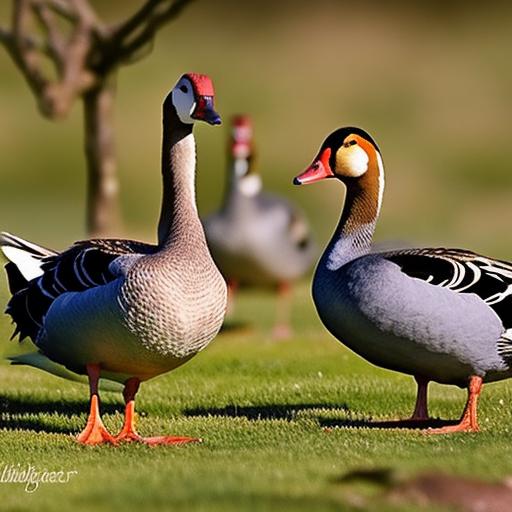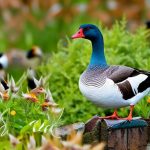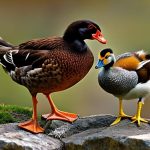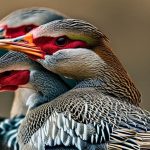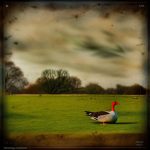Raising geese and ducks together can be a rewarding and enjoyable experience for poultry enthusiasts. While geese and ducks have different characteristics and needs, they can coexist harmoniously in a mixed flock. This article will provide a comprehensive guide to keeping geese and ducks together, including the benefits, breed selection, housing requirements, feeding and watering needs, health and disease prevention, managing egg production, handling behavioral issues, and tips for keeping them safe from predators.
Key Takeaways
- Keeping geese and ducks together is possible and can be beneficial.
- Raising a mixed flock can provide a variety of eggs and meat.
- Choosing the right breeds is important for compatibility and productivity.
- Adequate housing and shelter is necessary for the health and safety of the flock.
- Proper feeding, watering, and disease prevention are crucial for the well-being of geese and ducks.
Benefits of Raising Geese and Ducks Together
One of the main benefits of keeping a mixed flock of geese and ducks is natural pest control. Geese are known for their ability to graze on grass and weeds, while ducks are excellent at foraging for insects and snails. By allowing them to roam freely in your yard or garden, they can help control pests without the need for harmful chemicals.
Another advantage of raising geese and ducks together is their complementary diets. Geese primarily feed on grass and vegetation, while ducks prefer a diet that includes insects, worms, and aquatic plants. By combining their feeding habits, you can ensure that your flock has a varied and balanced diet.
Furthermore, keeping geese and ducks together can lead to increased egg production. Geese are known for their large eggs with rich yolks, while ducks are prolific layers. By having both geese and ducks in your flock, you can enjoy a steady supply of eggs throughout the year.
Lastly, raising a mixed flock of geese and ducks can provide entertainment value. Geese are known for their curious and social nature, while ducks are playful and entertaining to watch. Their interactions can bring joy and amusement to both children and adults alike.
Choosing the Right Breeds for Your Flock
When selecting breeds for your mixed flock of geese and ducks, there are several factors to consider. First, you need to ensure that the breeds you choose are compatible in terms of size and temperament. Geese are generally larger and more aggressive than ducks, so it is important to choose duck breeds that can hold their own.
Recommended breeds for a mixed flock include the Pekin duck, which is known for its calm and friendly nature, and the Khaki Campbell duck, which is a prolific layer. For geese, the Toulouse and Embden breeds are popular choices due to their docile temperament and good egg production.
Housing and Shelter Requirements for Geese and Ducks
Geese and ducks have different housing requirements, but they can share a coop or shelter if it is designed properly. The coop should be spacious enough to accommodate both geese and ducks comfortably, with separate nesting areas for each species.
It is important to provide adequate ventilation in the coop to prevent moisture buildup and respiratory issues. Additionally, the coop should be predator-proof, with secure fencing and locks to keep out predators such as raccoons and foxes.
In terms of shelter requirements for different seasons, geese and ducks are both hardy birds that can tolerate cold temperatures. However, they should have access to fresh water at all times, so it is important to ensure that their water source does not freeze during winter months.
Keeping the coop clean is essential for the health of your mixed flock. Regularly remove droppings and replace bedding to prevent the buildup of bacteria and parasites. Providing a clean environment will help prevent diseases and keep your geese and ducks healthy.
Feeding and Watering Your Mixed Flock
Geese and ducks have different nutritional requirements, but they can be fed together with some adjustments. Geese primarily feed on grass and vegetation, so providing them with access to a pasture or allowing them to graze in your yard is ideal. Ducks, on the other hand, require a diet that includes insects, worms, and aquatic plants. You can supplement their diet with commercial poultry feed that is specifically formulated for ducks.
When it comes to watering your mixed flock, both geese and ducks require access to clean and fresh water at all times. Geese enjoy splashing and bathing in water, so providing a shallow pool or pond for them to swim in is beneficial. Ducks also enjoy swimming, so having a larger body of water for them to paddle around in is ideal.
It is important to keep the water clean and free from contaminants. Regularly change the water and clean the containers to prevent the buildup of algae and bacteria. Providing clean water will help keep your geese and ducks healthy and hydrated.
Health and Disease Prevention for Geese and Ducks
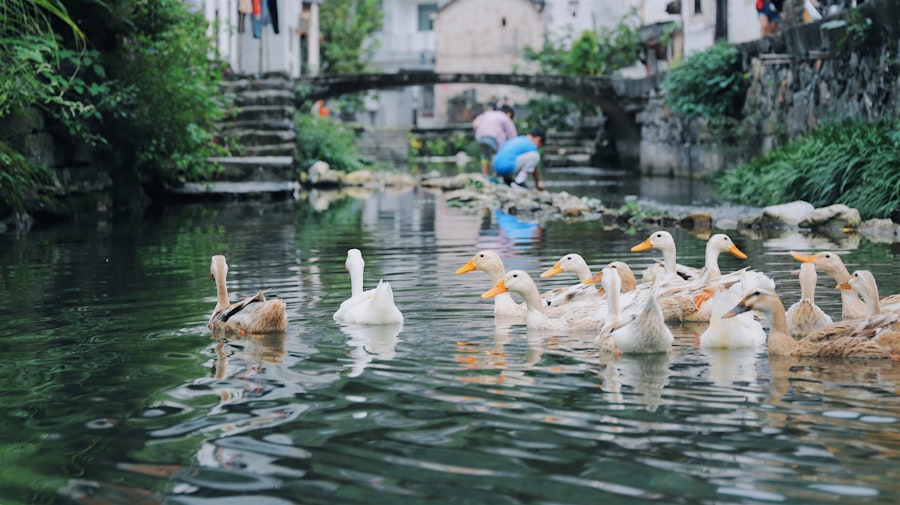
Geese and ducks are generally hardy birds, but they can still be susceptible to certain health issues. Common health issues for geese include respiratory infections, bumblefoot, and egg binding. Ducks are prone to respiratory infections, parasites, and egg-related issues.
To prevent these health issues, it is important to provide a clean and sanitary environment for your mixed flock. Regularly clean the coop, remove droppings, and replace bedding to prevent the buildup of bacteria and parasites.
Additionally, providing a balanced diet that meets their nutritional needs will help keep your geese and ducks healthy. Supplementing their diet with vitamins and minerals can also boost their immune system.
It is important to monitor your flock for any signs of illness. Common signs of illness in geese and ducks include lethargy, loss of appetite, abnormal droppings, difficulty breathing, and changes in behavior. If you notice any of these symptoms, it is important to consult a veterinarian who specializes in poultry health.
Managing Egg Production in a Mixed Flock
Geese and ducks have different egg production patterns. Geese are seasonal layers, typically laying eggs in the spring and early summer. Ducks, on the other hand, are prolific layers and can lay eggs throughout the year.
To manage egg production in a mixed flock, it is important to provide appropriate nesting areas for both geese and ducks. Geese prefer to nest on the ground, so providing a secluded area with straw or hay is ideal. Ducks prefer to nest in elevated boxes or nesting baskets, so providing these options will encourage them to lay their eggs in the designated areas.
To maximize egg production, it is important to provide a balanced diet that meets their nutritional needs. Supplementing their diet with calcium can also help improve eggshell quality.
Handling Behavioral Issues Between Geese and Ducks
Behavioral issues between geese and ducks can arise due to differences in size and temperament. Geese are generally larger and more aggressive than ducks, which can lead to bullying or territorial behavior.
To manage aggressive behavior, it is important to provide enough space for both geese and ducks to establish their own territories. Providing multiple feeding and watering stations can also help prevent competition and aggression.
If behavioral issues persist, it may be necessary to separate problem birds. This can be done by providing separate enclosures or using temporary fencing to create separate areas within the coop or yard.
Tips for Keeping Geese and Ducks Safe from Predators
Geese and ducks are vulnerable to predators such as raccoons, foxes, and birds of prey. To keep your mixed flock safe, it is important to secure your coop and run.
Use sturdy fencing that is buried at least a foot into the ground to prevent predators from digging under. Install locks on doors and windows to prevent predators from gaining access to the coop.
Additionally, providing natural deterrents such as motion-activated lights or scarecrows can help deter predators from approaching your flock.
Enjoying the Rewards of Raising a Mixed Flock of Geese and Ducks
Raising a mixed flock of geese and ducks can be a rewarding and enjoyable experience. The benefits of keeping geese and ducks together, such as natural pest control, complementary diets, increased egg production, and entertainment value, make it a worthwhile endeavor.
By choosing the right breeds, providing appropriate housing and shelter, feeding and watering them properly, ensuring their health and disease prevention, managing egg production, handling behavioral issues, and keeping them safe from predators, you can create a harmonious and thriving mixed flock.
So why not give it a try? Raising geese and ducks together can provide you with fresh eggs, natural pest control, and hours of entertainment. With the right knowledge and preparation, you can enjoy the rewards of a successful mixed flock.
If you’re interested in keeping geese with ducks, you may also want to check out this informative article on the Poultry Wizard website about the number of eggs geese lay. Understanding the egg-laying habits of geese can help you plan and manage your flock effectively. To learn more, click here: https://poultrywizard.com/breeding-geese/how-many-eggs-do-geese-lay/.
FAQs
What are the benefits of keeping geese with ducks?
Keeping geese with ducks can provide several benefits such as increased security against predators, better foraging and grazing, and improved socialization for both species.
What are the differences between geese and ducks?
Geese are larger and more aggressive than ducks. They have longer necks and legs, and their bills are more prominent. Geese are also known for their honking calls, while ducks have a quacking sound.
What are the challenges of keeping geese with ducks?
One of the main challenges of keeping geese with ducks is that geese can be territorial and aggressive towards other birds, including ducks. Additionally, geese require more space and water than ducks, which can be a challenge for smaller backyard flocks.
What should I feed my geese and ducks?
Geese and ducks have similar dietary needs and can be fed a diet of commercial poultry feed, supplemented with fresh greens and vegetables. They also require access to clean water for drinking and bathing.
How do I introduce geese to my existing duck flock?
When introducing geese to an existing duck flock, it is important to do so gradually and under close supervision. It is also recommended to introduce geese when they are young and still growing, as they will be less aggressive towards other birds.
What are some common health issues that can affect geese and ducks?
Geese and ducks can be susceptible to a range of health issues, including respiratory infections, parasites, and nutritional deficiencies. It is important to provide them with proper nutrition, clean living conditions, and regular veterinary care to prevent and treat these issues.
Meet Walter, the feathered-friend fanatic of Florida! Nestled in the sunshine state, Walter struts through life with his feathered companions, clucking his way to happiness. With a coop that’s fancier than a five-star hotel, he’s the Don Juan of the chicken world. When he’s not teaching his hens to do the cha-cha, you’ll find him in a heated debate with his prized rooster, Sir Clucks-a-Lot. Walter’s poultry passion is no yolk; he’s the sunny-side-up guy you never knew you needed in your flock of friends!

